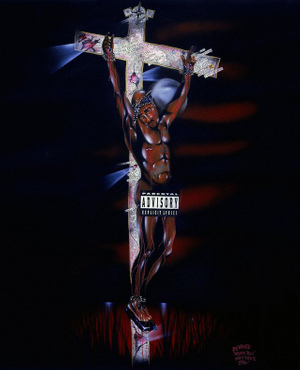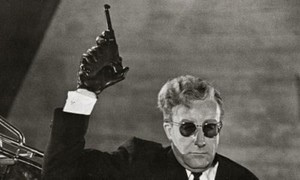 necromancer
necromancerI don't really mind "chan culture" because I'm desensitized to it kinda, it's just gets annoying to me for a while because no one is actually discussing well, it's bunch of anons s***posting wojak memes or talking about da j00s being responsible for everything bad and it gets annoying, but once in a while, there are some good posts
im mainly talking about other imageboards, but im pretty sure leftypol is susceptible to the same dumb habits
i still use 4chan for some general threads and wallpapers but thats really it
i kinda grew out of that edgy s*** years ago, i just don't like when anons (/leftypol/ or r/stupidpol) use that "no idpol" rule to be outright reactionary, instead of critiquing structure and basically just do psuedo-tucker carlson arguments under the guise of "leftism"
yeah there’s the usual dumb habits u mentioned, the board surprisingly doesn’t get that reactionary due to the no idpol rule and it does it usually gets called out on, i haven’t seen much of the psuedo tucker bs since most the of the site seems well read and often knows what they’re talking about compared to left twitter.
 mythic
mythicEvola was an idiot. I would actually argue the opposite; it's obvious that Italian fascism was reactionary against ideals that could be 'protestant', its Roman-warrior posturing should be obvious enough to disqualify it from 'protestant' associations. The 'Protestant morality in Western history' is the very genesis of the fabric of this conversation, if it wasn't for that deviation there would be no political ideology or 'nationalism' we are experiencing the 'effects' of its 'cause' at this moment.
When you say 'aesthetic' do you mean sentiment? I think you are misunderstanding what I initially said, this 'blending' of politics with pseudospirituality in a way that could be called 'esoteric' (by people who don't know what they're talking about) is the multi-century labour of the Theosophical Society, certainly the Nazis were exposed to some of their theories but Hitler was professedly an 'atheist' was he not? It's just vague imperialistic humanism wearing a different mask. Certainly it seems to me that 'esoteric fascism' is just Nazism based on what I can glean from this thread after my initial post. But the theosophical/protestant angle is the very syncretism of 'Christian', as you 'aesthetics', with politics that creates such an ideological dumpster fire as this. But if these people want to make a 'new Atlantis' let them, it ended so well for them!Evola was indeed an idiot, I'm not defending the ideology, I'm just explaining its roots and where it came from. His influence on this is incredibly important and you can't really disregard it. There isn't anyone as important to the whole concept of esoteric fascism than him. Evola was so reactionary he was basically reactionary to even political fascism itself; hence why he used the term "superfascist" and why he did distinguished between that and "fascism" as a political movement otherwise. The discussion of where the modern "esoteric fascism" comes from is just him, that's literally it, most people don't even reference or know Weininger anymore.
The omnipresence of protestantism doesn't really have anything to do with the core discussion because I'm not arguing or discussing deconstructing relevant hermeneutics or western epistemology. I'm simply talking about historically where people online are getting their ideas from.
Obviously if you want to discuss where people like Evola themselves got their ideas on a further level from then you're correct, but that's a deeper discussion which I don't think is warranted in this context because there really isn't any tangible political value in any of Evola's remaining writing. It may as well be reading fiction more than reading a religious scripture or political doctrine at this point.
What I think you're confusing is the lineage of the ideology in question though. "Esoteric fascism" and nazism are not intrinsically linked although there is a historical overlap of the two. You obviously have the Völkisch faux-paganism and Nazi Occultism angles of which the latter is definitely influenced by the debris of Theosophy, although a lot of wider Nazi ideology on the spiritual side comes from Weininger, which is a b******ization of a lot of different influences at once. Even regular fascism & nazism themselves have nothing to do with each other ideologically; nazism just subsumed fascism due to the failure of italy as a state and now bears the intrinsic association, but the wider philosophy of fascism in origin as well as in mutation (Francoism, Salazar, etc.) have virtually nothing to do with nazism itself.
On the other hand, Evola was not directly influential in any nazi or fascist parties historically and while he was in an earshot of them at all times, he never really integrated any thought into the political history; hence why he also was not prosecuted post-war. Most writing from Evola goes beyond the line of theosophy (although there is influence for sure), and taps into folklorish faux-histories of indoaryanism and pagan lore and whatnot.
What I point to with Christianity is less historical and more in the modern sense of how this ideology is formed is that there is literally no coherency or framework of belief. It's just people online taking cool aesthetics they like and mishmashing them together, so you can weird clustering of nazism and christianity for example or similar. The online emergence is distinct from its historical predecessors, and since there's no real life political movements embodying any of these ideas, i have to kind of differ to the ahistorical social explanation of things.
You're correct in your wider points of referral to protestantism and Christianity but imo it's unrelated to the actual direct topics of discussion here in a modern context. I'm not really trying to deconstruct the philosophies here.
The reason I say this is because I don't think in these highly localized discussions it's worthwhile to chase after philosophical ancestries. Like of course the latent influence of protestantism and theosophy are omnipresent, but you can break that down even further. Pre-centralized theosophy as a result of Hermeticism & Neoplatonism, Gnosticism as a precursor to Apocrypha, Jewish Mysticism & Merkabah being hijacked by christians, and so on and so on. krishna bound
krishna boundEvola was indeed an idiot, I'm not defending the ideology, I'm just explaining its roots and where it came from. His influence on this is incredibly important and you can't really disregard it. There isn't anyone as important to the whole concept of esoteric fascism than him. Evola was so reactionary he was basically reactionary to even political fascism itself; hence why he used the term "superfascist" and why he did distinguished between that and "fascism" as a political movement otherwise. The discussion of where the modern "esoteric fascism" comes from is just him, that's literally it, most people don't even reference or know Weininger anymore.
The omnipresence of protestantism doesn't really have anything to do with the core discussion because I'm not arguing or discussing deconstructing relevant hermeneutics or western epistemology. I'm simply talking about historically where people online are getting their ideas from.
Obviously if you want to discuss where people like Evola themselves got their ideas on a further level from then you're correct, but that's a deeper discussion which I don't think is warranted in this context because there really isn't any tangible political value in any of Evola's remaining writing. It may as well be reading fiction more than reading a religious scripture or political doctrine at this point.
What I think you're confusing is the lineage of the ideology in question though. "Esoteric fascism" and nazism are not intrinsically linked although there is a historical overlap of the two. You obviously have the Völkisch faux-paganism and Nazi Occultism angles of which the latter is definitely influenced by the debris of Theosophy, although a lot of wider Nazi ideology on the spiritual side comes from Weininger, which is a b******ization of a lot of different influences at once. Even regular fascism & nazism themselves have nothing to do with each other ideologically; nazism just subsumed fascism due to the failure of italy as a state and now bears the intrinsic association, but the wider philosophy of fascism in origin as well as in mutation (Francoism, Salazar, etc.) have virtually nothing to do with nazism itself.
On the other hand, Evola was not directly influential in any nazi or fascist parties historically and while he was in an earshot of them at all times, he never really integrated any thought into the political history; hence why he also was not prosecuted post-war. Most writing from Evola goes beyond the line of theosophy (although there is influence for sure), and taps into folklorish faux-histories of indoaryanism and pagan lore and whatnot.
What I point to with Christianity is less historical and more in the modern sense of how this ideology is formed is that there is literally no coherency or framework of belief. It's just people online taking cool aesthetics they like and mishmashing them together, so you can weird clustering of nazism and christianity for example or similar. The online emergence is distinct from its historical predecessors, and since there's no real life political movements embodying any of these ideas, i have to kind of differ to the ahistorical social explanation of things.
You're correct in your wider points of referral to protestantism and Christianity but imo it's unrelated to the actual direct topics of discussion here in a modern context. I'm not really trying to deconstruct the philosophies here.
The reason I say this is because I don't think in these highly localized discussions it's worthwhile to chase after philosophical ancestries. Like of course the latent influence of protestantism and theosophy are omnipresent, but you can break that down even further. Pre-centralized theosophy as a result of Hermeticism & Neoplatonism, Gnosticism as a precursor to Apocrypha, Jewish Mysticism & Merkabah being hijacked by christians, and so on and so on.I really like this response, and you've given me a lot to chew on here. Let's see...
Evola rides a weird line, he disassociated himself from the actual traditionalists by being too 'modern' and also just injected enough 'modernity' into his writings to be palatable to 'modern' people. I must also add that Evola was fundamentally disconnected and probably opposed 'theosophy' as his traditional teaching would have so-to-say 'seen through it'. Although I can see how to an outside observer not acquainted with either theosophy or 'traditionalism' they can seem similar on the exterior.
Now I want to begin by saying that I believe it is of the utmost importance to trace what you call a 'philosophical ancestry' because nothing happens in and of itself and if we actually want to understand something 'as itself' and not simply 'as it is presented' then it is essential to get to the kernel within the thing because if we know the kernel we can know the whole thing. And in fact here is where I must say that everything you have said in this post only further cements my previous assertions particularly such notions as 'how this ideology is formed... there is no coherenc(e) or framework of belief' and this is at once both a theosophical notion, the 'syncretism' (building something out of nothing, or building something from something but not with a foundation first/pseudoreligion essentially) and also the essence of protestantism itself. The online emergence is simply the modality of manifestation, of course these people aren't going to get together in the street, they can get together without leaving their house! This doesn't mean they won't be able to 'band together' physically later as the original protestants did.
I think above all what I am trying to get at is the 'idea' of Protestantism as the materialisation of these ideas at present, a doctrine is rejected, co-opted, and re-appropriated. I think it's fully and completely relevant to this discussion in a modern context, because while these people might not be getting their ideas from the Testament as the original Protestants, but from 'philosophers', they are taking something as they want it to be presented to them and making it theirs. Now, does the idea precede the material or the material precede the idea? This is a good question to ask in this context. I'm not particularly trying to deconstruct the philosophy either but this is merely how I see it, and how I think it should be seen, not as a 'thing-in-itself' but as a manifestation of a broader 'idea', 'modernity' itself perhaps, certainly not something particularly nuanced.
Now what you're describing at the end here is the theosophic syncretism itself, taking notions together to build something but not seeing the thing itself as already built.

